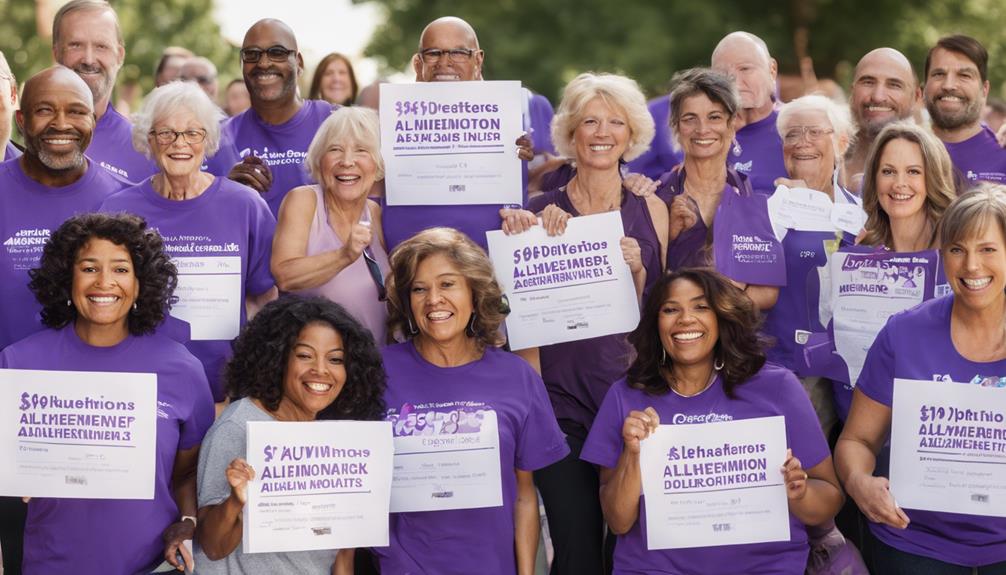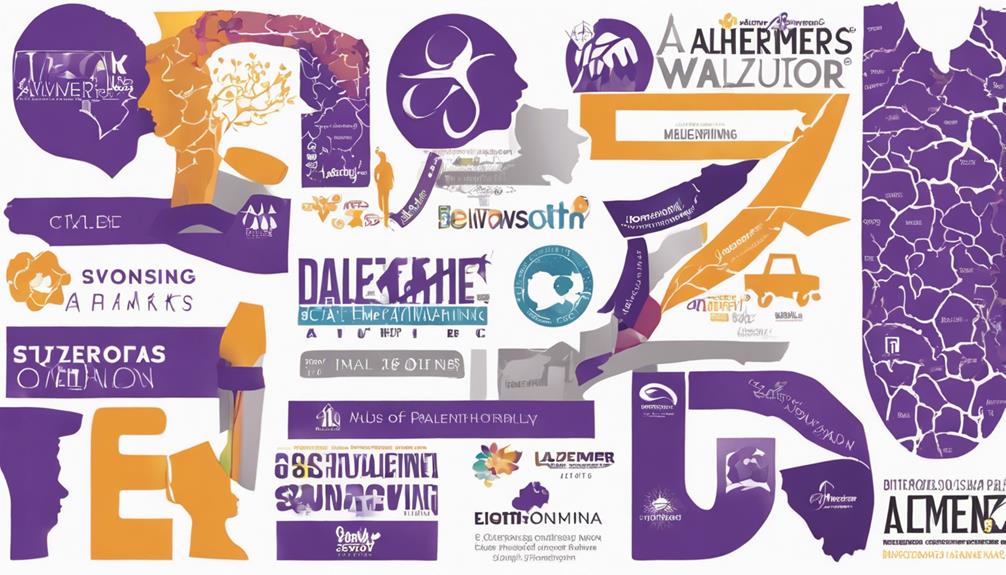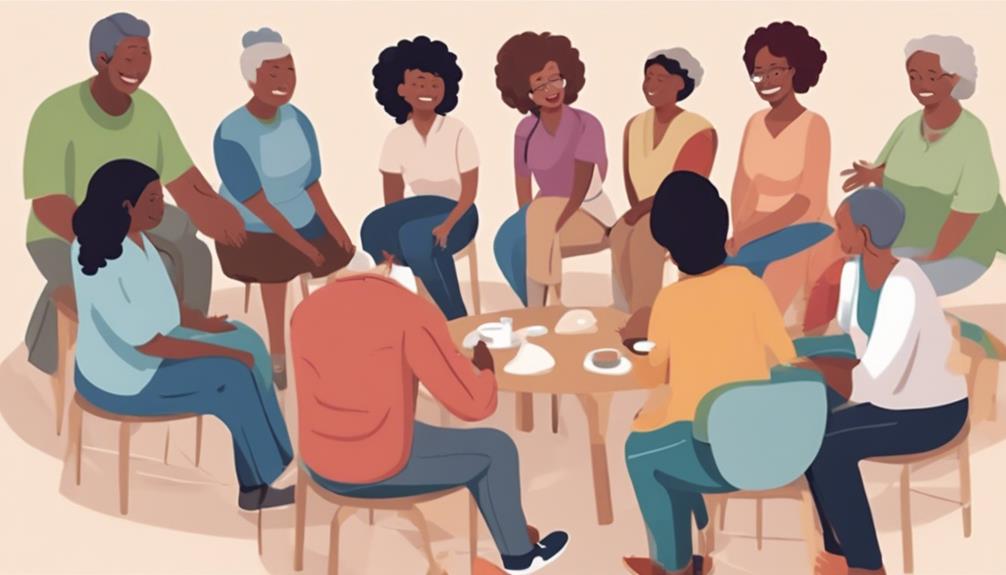Walking through the city streets, surrounded by a large group of supporters wearing purple shirts, I realized that each stride forward symbolized planting a seed of hope in the fight against Alzheimer’s.
The unity of purpose in that moment was palpable, a reminder of the strength found in coming together for a cause greater than ourselves.
But what happened next truly solidified our commitment to making a difference…
Key Takeaways
- Support Alzheimer’s research and care through community participation.
- Engage in educational sessions and health screenings at the event.
- Sponsorship opportunities for corporate social responsibility and event success.
- Enjoy scenic walk routes through Denver’s City Park, Cherry Creek Trail, and Cheesman Park.
Event Overview

What’re the key highlights of the Alzheimer Walk Denver event?
The Alzheimer Walk Denver is a vital event that aims to raise awareness and funds for Alzheimer’s disease research and support programs. Participants gather to support individuals and families affected by this condition, fostering a sense of community and solidarity in the fight against Alzheimer’s. The event typically features a scenic walk route through the heart of Denver, providing an opportunity for individuals of all ages to come together and show their support.
Throughout the walk, participants engage in various activities such as informational booths, health screenings, and educational sessions about Alzheimer’s disease. Local healthcare providers and organizations also contribute by offering resources and information to attendees. Additionally, inspiring speeches from individuals impacted by Alzheimer’s and leading researchers in the field provide valuable insights into the latest advancements in Alzheimer’s research and care.
Registration Details

Moving on from the event overview, let’s now focus on the registration details for the Alzheimer Walk Denver.
To participate in this meaningful event, please take note of the following key registration details:
- Online Registration: Secure your spot by visiting our official event website and completing the online registration form. Provide your essential details, such as name, contact information, and any relevant affiliations.
- Registration Fee: A nominal registration fee is required to cover event expenses and support the cause. Your contribution goes towards Alzheimer’s research and support programs for individuals and families affected by the disease.
- Deadline: Ensure you register before the deadline to guarantee your participation in the Alzheimer Walk Denver. Late registrations may be subject to availability and additional fees. Don’t miss the chance to join us in raising awareness and funds for Alzheimer’s care and research.
Fundraising Opportunities

We’ll now explore the fundraising opportunities available for the Alzheimer Walk Denver event, focusing on two key points: the benefits of sponsorship and the utilization of online donation platforms.
Understanding the advantages of sponsorship can help individuals and businesses contribute in a meaningful way to the cause.
Additionally, leveraging online donation platforms can streamline the fundraising process and reach a wider audience, ultimately maximizing the impact of each donation.
Sponsorship Benefits Overview
Regularly updated Sponsorship Benefits Overview documents provide detailed information on the various fundraising opportunities available for the Alzheimer Walk Denver event. These documents aim to assist potential sponsors in understanding the benefits of supporting the cause.
- Logo Placement: Sponsors may have their logos prominently displayed on event banners, t-shirts, and promotional materials, increasing brand visibility.
- Exclusive Networking Events: Sponsors gain access to exclusive networking events where they can connect with other businesses and community leaders.
- Recognition Opportunities: Sponsors receive public recognition during the event, showcasing their commitment to Alzheimer’s research and support services.
These benefits not only help sponsors achieve their corporate social responsibility goals but also contribute significantly to the success of the Alzheimer Walk Denver.
Online Donation Platforms
Utilizing online donation platforms offers a convenient and efficient way for supporters to contribute to the fundraising efforts for the Alzheimer Walk Denver event. These platforms provide a secure space for donors to make financial contributions, eliminating the need for physical cash transactions.
By leveraging online donation platforms, participants can easily share their fundraising pages across various social media channels, reaching a wider audience and increasing donation potential. Additionally, these platforms often offer features such as automated donation receipts and tracking tools, allowing both donors and organizers to monitor progress in real-time.
Walk Route Information

The walk route information for the Alzheimer Walk in Denver includes details on route highlights, water stations, and restroom locations.
Understanding the route highlights can help participants prepare for the terrain and any notable landmarks along the way.
Knowing the locations of water stations and restrooms ensures that participants can stay hydrated and comfortable throughout the walk.
Route Highlights
Exploring the picturesque streets and scenic paths of the Alzheimer Walk Denver reveals a diverse array of route highlights that showcase the beauty of the city while supporting a crucial cause.
- City Park: Enjoy a peaceful stroll through the iconic City Park, surrounded by lush greenery and stunning views of the city skyline.
- Cherry Creek Trail: Traverse the serene Cherry Creek Trail, offering a refreshing escape into nature with the soothing sounds of the flowing creek.
- Cheesman Park: Experience the tranquility of Cheesman Park, known for its elegant gardens and historic monuments, providing a serene setting for reflection and unity during the walk.
Water Stations
Navigating the Alzheimer Walk Denver route, participants will find strategically placed water stations providing essential hydration and support along the path. These stations are strategically located at regular intervals to ensure walkers can rehydrate and maintain their energy levels throughout the event.
Each water station is manned by dedicated volunteers who are ready to assist participants with refilling their water bottles and providing any necessary support. The water provided at these stations is carefully sourced and tested to meet quality standards, ensuring the safety and well-being of all participants.
Additionally, waste management practices are in place to keep the walk route clean and environmentally friendly. Participants can rely on these water stations to stay refreshed and energized as they support this important cause.
Restroom Locations
Identifying convenient restroom locations along the Alzheimer Walk Denver route is crucial for ensuring participant comfort and accessibility.
- The first restroom station is located near the starting point of the walk, providing early access for participants.
- A second restroom facility is strategically positioned at the midway point of the route, offering a convenient break for walkers.
- The final restroom stop is positioned near the finish line, ensuring that participants can freshen up after completing the walk.
These carefully selected restroom locations aim to enhance the overall experience of participants, providing necessary facilities at key points along the route. Ensuring access to clean and accessible restrooms contributes significantly to the comfort and enjoyment of all involved in the Alzheimer Walk Denver.
Volunteer Sign-Up

Upon completion of this sentence, volunteers will be able to sign up to participate in the Alzheimer Walk Denver event. Volunteer sign-up is a crucial aspect of our event, as it allows individuals to contribute their time and skills towards a meaningful cause.
To register as a volunteer for the Alzheimer Walk Denver, please visit our official event website. Once on the website, navigate to the ‘Volunteer’ section and fill out the required information, including your name, contact details, availability, and any specific preferences you may have regarding volunteer roles.
By signing up as a volunteer, you’ll have the opportunity to support participants, assist with event logistics, and contribute to the overall success of the walk. We value the dedication and commitment of our volunteers, as they play a vital role in creating a positive experience for all involved.
Join us in making a difference and sign up to volunteer at the Alzheimer Walk Denver today!
Sponsorship Options

To sustain the impactful efforts of the Alzheimer Walk Denver event, we offer various sponsorship options that enable businesses and organizations to align with our mission and support the fight against Alzheimer’s disease.
- Platinum Sponsorship: This premier level of sponsorship offers prominent recognition throughout the event, including logo placement on marketing materials, exclusive speaking opportunities, and a dedicated booth space at the walk.
- Gold Sponsorship: Our Gold level sponsorship provides significant visibility, with logo placement on event signage, recognition in press releases, and the opportunity to have promotional materials distributed to participants.
- Silver Sponsorship: Ideal for smaller businesses seeking to make a difference, the Silver sponsorship package includes logo placement on our website, acknowledgment in social media posts, and recognition in the event program.
These sponsorship options not only showcase your commitment to the community but also provide vital support for Alzheimer’s research and care initiatives. Join us in the fight against Alzheimer’s by becoming a sponsor of the Alzheimer Walk Denver.
Day-of Event Schedule

The day of the Alzheimer Walk Denver event will be meticulously organized, with a detailed schedule outlining key activities and timings to ensure a smooth and impactful experience for participants and supporters alike.
The event will kick off at 8:00 a.m. with participant check-in and on-site registration for those who haven’t pre-registered. At 9:00 a.m., a warm-up session led by fitness instructors will energize everyone before the walk begins at 9:30 a.m. Participants will follow a designated route through the scenic park, with water stations strategically placed along the way to keep everyone hydrated.
Throughout the walk, volunteers will be stationed at key points to provide assistance and ensure everyone stays on course. As participants cross the finish line, they’ll be greeted with refreshments and a sense of accomplishment. The event will conclude with a brief closing ceremony at 12:00 p.m., where top fundraisers will be recognized, and participants can share their experiences.
This thoughtfully planned schedule aims to create a memorable and impactful day for all involved.
Post-Walk Celebration

Following the successful completion of the Alzheimer Walk Denver event, the Post-Walk Celebration will provide a meaningful opportunity for participants to reflect on their achievement and connect with fellow supporters. The celebration aims to foster a sense of community and gratitude among attendees, acknowledging the collective effort put forth in raising awareness and funds for Alzheimer’s research.
During the Post-Walk Celebration, participants can look forward to:
- A heartfelt tribute to individuals affected by Alzheimer’s, honoring their strength and resilience.
- Interactive booths offering educational resources on brain health and caregiving tips, empowering attendees with knowledge.
- Refreshments and light snacks, providing a moment of respite for weary walkers and a chance to mingle with like-minded advocates.
Frequently Asked Questions
Are Pets Allowed to Participate in the Alzheimer Walk Denver?
Yes, pets are allowed to participate in the Alzheimer Walk Denver. It can be a great opportunity for individuals to bond with their furry companions while supporting a noble cause.
Make sure to check the event guidelines for any specific rules regarding pets, such as leashes or waste disposal requirements.
Walking with pets can bring joy, companionship, and added motivation to the experience of participating in charitable events like this one.
What Accommodations Are Available for Individuals With Disabilities at the Event?
We strive to ensure individuals with disabilities have access to necessary accommodations at events. Various options such as wheelchair ramps, accessible seating, sign language interpreters, and assistive listening devices may be provided.
Our goal is to create an inclusive environment where everyone can participate and enjoy the event to the fullest. Please reach out to event organizers in advance to discuss specific needs and how we can support you.
Is There a Minimum Age Requirement to Participate in the Walk?
There’s no minimum age requirement to participate in the walk. People of all ages are welcome to join us for this event.
It provides a great opportunity for individuals and families to come together in support of a worthy cause. The walk offers a chance to raise awareness about Alzheimer’s and show solidarity with those affected by the disease.
We encourage everyone to participate and make a difference in the fight against Alzheimer’s.
Are There Any Virtual Participation Options for Those Unable to Attend in Person?
Yes, there are virtual participation options available for those unable to attend in person. Virtual participation allows individuals to engage in the event remotely, contributing to the cause from afar.
This option enables a broader reach and inclusivity, ensuring that more people can participate and support the cause, despite physical limitations. Virtual participation offers a convenient and accessible way to be involved in the event and make a difference.
Will There Be Medical Staff or First Aid Stations Available Along the Walk Route?
Yes, medical staff and first aid stations will be available along the walk route. These professionals are equipped to provide immediate assistance in case of any medical emergencies or minor injuries. They play a crucial role in ensuring the safety and well-being of all participants during the event.
Their presence offers peace of mind to both walkers and organizers, creating a secure environment for everyone involved.
Conclusion
As we walk together in the fight against Alzheimer’s, we’re like a strong and resilient forest, each individual tree standing tall and united. Just as trees support each other through wind and storm, we support those affected by this disease.
Let’s continue to grow our impact, branch by branch, until we find a cure. Join us in Denver for the Alzheimer Walk and be a part of this powerful movement. Together, we can make a difference.









